There are many medicine feasts—and I saw one celebrated near the Oak Grove mission, and near, also, to the villages of Good Road, and the chief Man in the Clouds. It was on a dark cold day about the first of March. We left the fort at about nine o’clock and followed the road on the St. Peter’s river, which had been used for many months, but which, though still strong, was beginning to look unsafe. As we advanced towards the scene of the feast, many Indians from every direction were collecting, and hurrying forward, either to join in the ceremony about to be celebrated, or to be spectators. We ascended quite a high hill, and were then at the spot where all the arrangements were made to celebrate one of the most sacred forms of their religion. Many of the Indians to be engaged in the performance were entirely without protection from the severe cold—their bodies being painted and their heads adorned with their choicest ornaments, but throwing aside even their blankets, according to the laws of the ceremony. The Indians continued to assemble. At eleven o’clock, the dance commenced. Although I could not faithfully describe, yet I never can forget the scene. The dark lowering sky—the mantle of snow and ice thrown over all the objects that surrounded us, except the fierce human beings who were thus, under Heaven’s arch for a roof, about to offer to their deities a solemn worship.
Then the music commenced, and the horrid sounds increased the wildness of the scene; and the contortions of the medicine man, as he went round and round, made his countenance horrible beyond expression. The devoted attention of the savages, given to every part of the ceremony, made it in a measure interesting. There were hundreds of human beings believing in a Great Spirit, and anxious to offer him acceptable service; but how degraded in that service! How fallen from its high estate was the soul that God had made, when it stooped to worship the bones of animals, the senseless rock, the very earth that we stood upon! The aged man, trembling with feebleness, ready to depart to the spirit’s land, weary with the weight of his infirmities—the warrior treading the earth with the pride of middle age—the young with nothing to regret and everything to look forward to,—all uniting in a worship which they ignorantly believe to be religion, but which we know to be idolatry.
I was glad to leave the scene, and turn towards the house of the Rev. Mr. Pond, who lives near the spot where the feast was celebrated. Here, pursuing his duties and studies, does this excellent man improve every moment of his time to the advantage of the Sioux. Always ready to converse kindly with them in order to gain their confidence—giving medicine to the sick, and food to the hungry; doing all that lies in his power to administer to their temporal comfort, he labors to improve their condition as a people. How can it better be done than by introducing the Christian religion among them? This the missionaries are gradually doing; and did they receive proper assistance from government, and from religious societies, they would indeed go on their way rejoicing.




